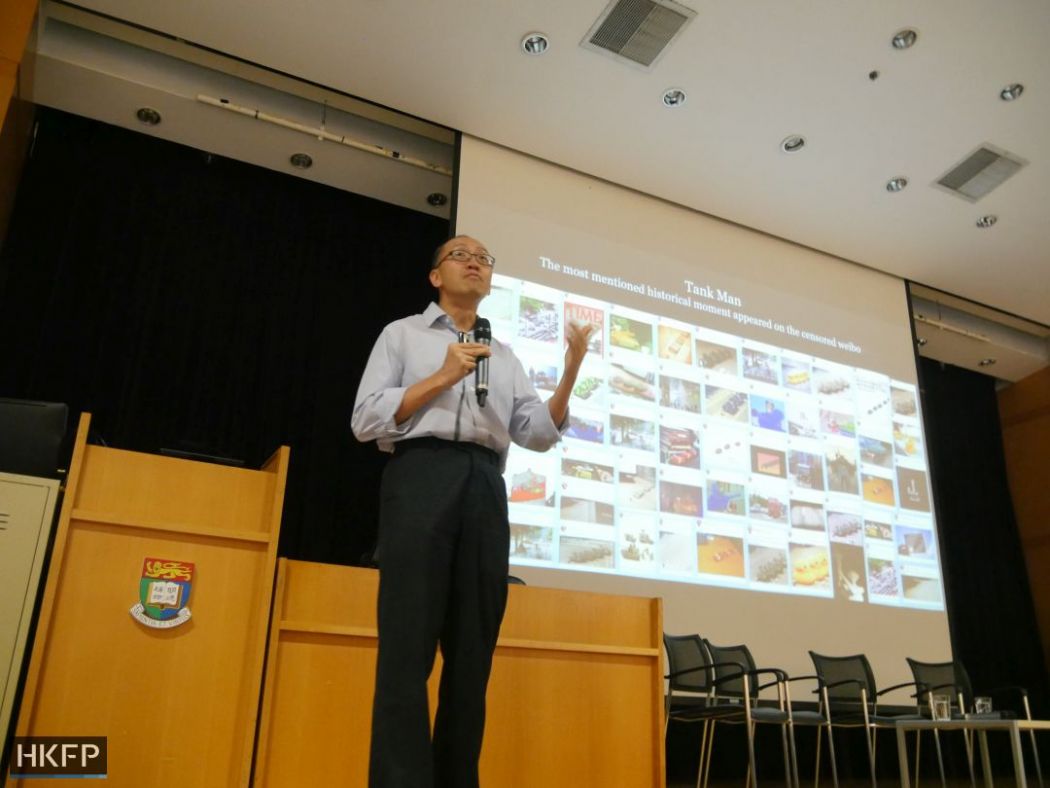A university scholar has unveiled an archive of over 1,200 censored Chinese social media posts related to the 1989 Tiananmen Square crackdown, providing a rare glimpse into China’s opaque internet ecosystem.
Fu King-wa, an associate professor at the University of Hong Kong’s journalism school, said he wanted to understand the motivations of Chinese social media users who tried to circumvent censorship. The result was “Weiboscope,” a data collection project that tracked over 100,000 Weibo user accounts from 2012 to 2018 – half of which were influential users, and the other half chosen at random.

Ahead of the 30th anniversary of the June 4 massacre, Fu published a set of 1,256 relevant Weibo image posts, available on the project’s website as well as social media.
“We manually identified all the ‘image-attached’ June 4th posts between June 1 and 4 during the whole period of time between 2012 and 2018 from our archive,” Fu said during an event at the University of Hong Kong on Monday.
The most popular image was a candle or a match burning in darkness, which appeared in more than 200 Weibo posts. Many of the posts included the “Tank Man” photo or derivative images, as well as short narrative posts.
The massacre ended months of student-led pro-democracy demonstrations in China. It is estimated that hundreds, perhaps thousands, of people died when the People’s Liberation Army was deployed to crack down on protesters in Beijing.
Some of the posts also included implicit references, such as playing on the numerals 8964 – which Fu called “seriously playful tactics” to subvert government control.
“The citizens want to signal to the government: we never forget, and also some people should take responsibility,” Fu said. “They disagree with the state discourse… that is why they need to create the counter-discourse.”
Chinese netizens were also looking for justice for the dead, Fu said. He noted that 13 per cent of the selected Weibo posts were related to Hong Kong, with some Chinese netizens thanking Hongkongers for continuing with their annual commemorative vigil in Victoria Park.
Rise of WeChat
Asked about China’s censorship regime, Fu said he strongly believed that the posts included in Weiboscope were censored by humans, instead of by artificial intelligence.
“If there were sensitive keywords they wouldn’t be able to post it, or to save it as a draft,” he said. This meant that the posts managed to slip through the initial net of computer-based censorship, but were later removed post-publication.
However, Fu said that there was a major shift in China’s online ecosystem since 2014, including the implementation of cybersecurity laws and the rise of multi-purpose messaging service WeChat.
Since WeChat favours semi-public messages only viewable by a user’s friends circle, it was more difficult to collect data on China’s censorship efforts. Fu said that he and other HKU researchers were monitoring the social media with WeChatscope, an initiative started last year.
‘Repressive trope’
In a separate presentation, journalist Louisa Lim also outlined the challenges faced by foreign correspondents in China who want to report on the anniversary of the crackdown. Of the 60 journalists surveyed, three quarters said they had experienced interference from the Chinese government, Lim said.

“This really underlines the determination of the Chinese authorities to stop Tiananmen anniversary reporting by the foreign press, or to control it,” she said. “We see different arms of the state working to limit coverage.”
Since foreign journalists could not access “memory carriers” such as the former student activists or their relatives, they could only write about the state repression they encountered during reporting, Lim added.
“The authorities are shaping Tiananmen coverage through this campaign of intimidation, and it really has a reductive effect on the story that journalists can tell – it has really shrunk the Tiananmen story down to one repressive trope.”
Correction 17/4: The HKU researchers have corrected a figure in their press release after its publication. The archive contains 1,256 items, not 1,056.
The Hong Kong Free Press #PressForFreedom 2019 Funding Drive seeks to raise HK$1.2m to support our non-profit newsroom and dedicated team of multi-media, multi-lingual reporters. HKFP is backed by readers, run by journalists and is immune to political and commercial pressure. This year’s critical fundraiser will provide us with the essential funds to continue our work into next year.

